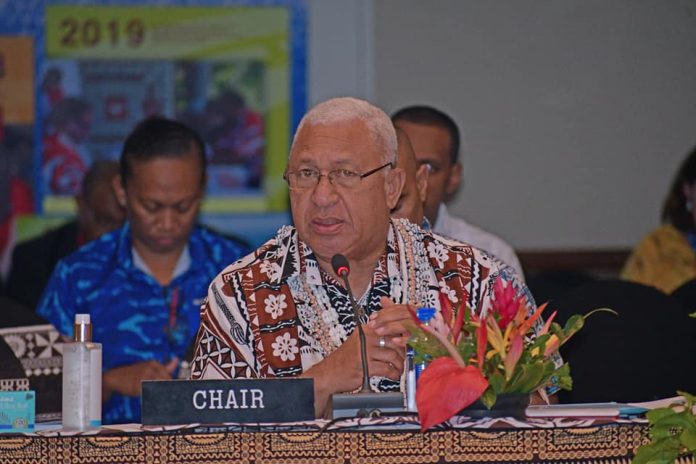By Pita Ligaiula
Fijian Prime Minister and Chair of the Pacific Islands Forum, Voreqe Bainimarama has welcomed the United States renewed engagement to the region by pledging an assistance of US$60 million on Tuna Treaty in next 10 years, a total of US$600 million.
The Tuna Treaty Agreement funding was announced Wednesday by U.S Vice President Kamala Harris during her address at the margins of the 51st Pacific Islands Forum Leaders Meeting in Suva.
“USA has long been a Pacific power –– your comprehensive remarks and commitment show that America is prepared to become a Pacific partner like never before. And we appreciate your clear response on the U.S Government contribution under the Treaty.
“Your readiness to request from U.S. Congress, US$60 million per year for the next ten years in connection with a new Economic Assistance Agreement with the Forum Fisheries Agency is a powerful commitment. If finalised, I am sure that everyone gathered here today(Wednesday) can agree that it would be a significant milestone in the relationship between the U.S and Pacific Parties,” said PM Bainimarama.
Bainimarama said the region looks forward to the U.S support in realising the objectives of the Treaty.
“The Treaty offers the United States an unparalleled platform to strengthen its relationship with the Pacific Islands Parties; to balance its various strategic interests in the Pacific region; and broaden our cooperation across regional security, responsible fisheries management, and economic development.
“We welcome the US$50 million per year in Economic Support Funds, along with US$10 million per year in separate programming targeted at mutually beneficial priorities. This includes combatting illegal, unreported, and unregulated fishing; ensuring fisheries are resilient; that fisheries management is adaptive to a changing climate and ocean; and promoting fisheries-related economic development,” Bainimarama said.
The South Pacific Tuna Treaty represents an ongoing agreement between the United States and 16 Pacific island countries.
The treaty allows for U.S purse seine vessels to fish in the exclusive economic zones of the Pacific island countries party to the treaty.
Parties to the South Pacific Tuna Treaty are Australia, Cook Islands, Federated States of Micronesia, Fiji, Kiribati, Marshall Islands, Nauru, New Zealand, Niue, Palau, Papua New Guinea, Samoa, Solomon Islands, Tonga, Tuvalu, Vanuatu and the United States.
In December 2016, the parties involved in the treaty agreed to a revised and updated treaty that modernised the way that U.S fishing vessels secure access to the productive tuna fishing waters of the treaty nations.
The amended treaty defines the number of fishing days in waters of the parties to the treaty that are exclusively available to fishing vessels from the United States, as well as defining a mechanism for U.S vessels to arrange for additional fishing access directly with the countries involved.
The treaty is viewed as a model of international and fishery cooperation and has helped establish fisheries observer and data reporting requirements, as well as monitoring, control and surveillance standards for the region’s fisheries, all of which are vital to deterring illegal, unreported, and unregulated fishing.
U.S Assistant Secretary of State for Oceans and International Environmental and Scientific Affairs, Monica Medina told Journalist in Suva, the Tuna Treaty has served as a cornerstone of political and economic cooperation between the U.S and the Pacific Islands for over three decades.
“This is a pivotal moment in so many ways — for the Pacific Islands and for the Pacific Island Forum; for the United States and our relationship with the Pacific. And it is also an important moment for our ocean as we seek to protect it from the impacts of climate change and strengthen the resilience of the blue economy.
“The Tuna Treaty has been a critical part of the U.S. relationship with the Pacific Islands for a long time. The U.S. relationships with the Pacific Islands are longstanding, and we will continue to strengthen them. The tuna treaty has been and will continue to be an important part of that relationship.
“We also stand with you in the fight to protect our ocean from the threats it faces. We all depend on the ocean, but few depend on it as much as the Pacific Islands. We welcome Pacific Islands’ leadership in putting a stop to overfishing and putting in place sustainable management of the valuable tuna resources in this region.
“We also stand with the Pacific Islands in the fight against the climate crisis, and we look to support you as you seek to strengthen your blue economies and make them resilient to the impacts of climate change,” said Medina.
The negotiations on the U.S Pacific treaty is expected to be completed in six months time and Fijian Minister for Fisheries Semi Koroilavesau has welcomed U.S support towards the Tuna Treaty.
“While we continue to appreciate the spirit of the treaty being fisheries access and development opportunities, we also recognise the unfolding potentials that the treaties can provide for our relationship.”
Koroilavesau said the agreement would allow subsidiary measures around climate change and maritime security to be negotiated.
“It’s tuna politics,” Koroilavesau said.
The agreement was described as unique because it provided the U.S with a forum to deal with Pacific countries in the region on a multilateral basis.
SOURCE: PACNEWS














